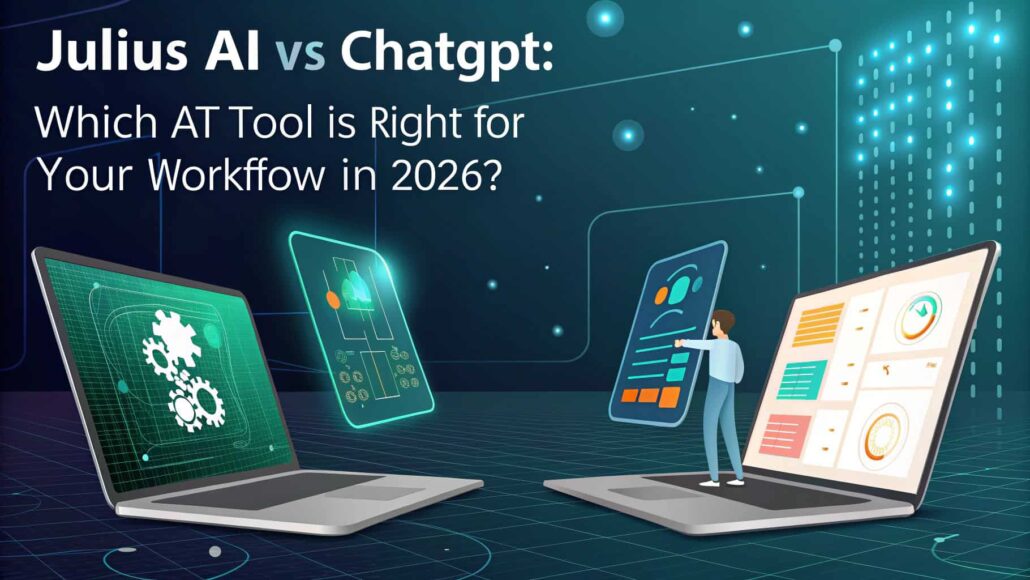
Julius AI vs ChatGPT
Artificial intelligence tools have revolutionized how we work, analyze data, and solve complex problems. Two platforms leading this transformation are Julius AI and ChatGPT, each offering distinct capabilities that cater to different professional needs.
By the end of this guide, you’ll have clear insights into the strengths, limitations, and ideal use cases for both platforms, enabling you to make an informed decision for your professional toolkit.
What Is Julius AI?
Julius AI is a specialized artificial intelligence platform designed primarily for data analysis and statistical computing. Built with data scientists, researchers, and analysts in mind, Julius AI transforms how users interact with complex datasets through natural language processing.
The platform allows users to upload datasets in various formats—including CSV, Excel, and JSON files—then ask questions about their data using plain English. Instead of writing complex code or formulas, you can simply ask “What’s the correlation between sales and marketing spend?” and receive detailed analysis with visualizations.
Julius AI stands out for its ability to generate Python and R code automatically, making advanced statistical analysis accessible to users without extensive programming knowledge.
What Is ChatGPT?
This large language model excels at understanding and generating human-like text across virtually any topic or domain.
The platform serves as a versatile AI assistant capable of writing content, answering questions, helping with coding problems, brainstorming ideas, and even engaging in creative tasks like storytelling or poetry.
Recent versions of ChatGPT have expanded beyond text generation to include image analysis, file processing, and web browsing capabilities.
Key Features Comparison
Data Analysis Capabilities
Julius AI was built specifically for data analysis. Users can perform advanced analyses like regression modeling, time series forecasting, and clustering analysis without writing a single line of code.
ChatGPT can certainly help with data-related questions and even assist with basic analysis when you paste data into the conversation. However, it lacks the specialized data processing capabilities and statistical rigor that Julius AI provides. ChatGPT is better suited for explaining data concepts or helping interpret results rather than performing the analysis itself.
Content Generation and Writing
ChatGPT dominates in content creation. Whether you need blog posts, emails, marketing copy, or technical documentation, ChatGPT can generate high-quality text across various styles and formats. The platform understands context, tone, and audience requirements exceptionally well.
Julius AI focuses primarily on generating reports and insights from data analysis rather than general content creation. While it can produce well-formatted analytical reports, it’s not designed for broader writing tasks like marketing content or creative writing.
User Interface and Experience
Julius AI offers a clean, data-focused interface where users can upload files, view visualizations, and interact with their datasets through chat. The platform prioritizes functionality for data work, with features like code generation and chart customization taking center stage.
ChatGPT provides a simple, conversation-based interface that feels natural and intuitive. The chat format makes it easy for users of all technical levels to interact with the AI, though this simplicity sometimes limits more complex workflows that require file uploads or specialized tools.
Integration and Workflow
Julius AI integrates well with common data formats and can export results to various platforms. The generated Python and R code can be used in other data science environments, making it valuable for teams that work across multiple tools.
ChatGPT offers API access and has spawned numerous third-party integrations. Many productivity tools, writing platforms, and business applications now incorporate ChatGPT functionality, making it accessible within existing workflows.
Pricing and Accessibility
Professional and enterprise tiers usually include additional features like larger file uploads, more complex analysis capabilities, and priority support. The pricing reflects its specialized nature and the value it provides for data-intensive work.
ChatGPT Pricing Options
ChatGPT offers both free and paid tiers. The free version provides access to the base model with some limitations on usage and features. ChatGPT Plus, the paid subscription, offers faster response times, access to the latest model versions, and additional features like image analysis and browsing capabilities.
For businesses, ChatGPT offers enterprise solutions with enhanced security, administration controls, and higher usage limits.
Best Use Cases for Julius AI
Research and Academic Work
Julius AI excels in academic and research environments where statistical rigor and detailed analysis are paramount. Researchers can quickly analyze survey data, perform hypothesis testing, and generate publication-ready visualizations without extensive programming knowledge.
The platform’s ability to show its work through generated code also makes it valuable for peer review and reproducible research practices.
Business Intelligence and Analytics
Companies dealing with sales data, customer analytics, or operational metrics find Julius AI particularly valuable. The platform can quickly identify trends, correlations, and insights that might take hours to discover using traditional spreadsheet analysis.
Financial Analysis
The platform’s statistical capabilities make it well-suited for analyzing financial time series, calculating various financial metrics, and creating reports for stakeholders.
Best Use Cases for ChatGPT
Content Marketing and Communication
ChatGPT shines in content creation scenarios.
Customer service teams also leverage ChatGPT for drafting responses, creating FAQ content, and handling routine inquiries.
Education and Training
Educators and trainers find ChatGPT valuable for creating lesson plans, generating practice questions, and explaining complex concepts in accessible language. The platform can adapt explanations for different skill levels and learning styles.
Students use ChatGPT for research assistance, writing feedback, and concept clarification, though proper usage guidelines are important to maintain academic integrity.
Software Development Support
The platform can explain code functionality, suggest improvements, and help troubleshoot common programming challenges.
While not a replacement for specialized development tools, ChatGPT serves as an excellent coding companion and learning resource.
Limitations and Considerations
Julius AI Limitations
Julius AI’s specialized focus on data analysis means it’s less useful for general AI assistance tasks. Users looking for a versatile AI assistant might find its capabilities too narrow for their broader needs.
The platform also requires users to have their data in compatible formats and may struggle with very large datasets or real-time data processing requirements.
ChatGPT Limitations
ChatGPT’s broad capabilities come with trade-offs in specialized domains. For serious data analysis work, it lacks the statistical rigor and specialized tools that dedicated platforms provide.
The platform also has knowledge cutoff dates and can sometimes generate plausible-sounding but incorrect information, requiring users to verify important facts and analysis.
Making Your Decision
Choose Julius AI If You Need
Select Julius AI when your primary needs involve data analysis, statistical computing, and generating insights from datasets. It’s ideal for roles in research, business intelligence, financial analysis, and any position requiring regular interaction with quantitative data.
The platform works best for users who have data to analyze and need professional-grade statistical capabilities without extensive programming requirements.
Choose ChatGPT If You Need
Opt for ChatGPT when you require a versatile AI assistant for content creation, general problem-solving, learning support, and communication tasks. It’s perfect for marketers, writers, educators, students, and professionals who need AI assistance across various domains.
ChatGPT suits users looking for a single AI tool that can handle diverse tasks rather than specialized data analysis.
Consider Using Both
Julius AI can handle the heavy data analysis while ChatGPT assists with writing reports, creating presentations, and communicating findings to stakeholders.
This combined approach leverages each platform’s strengths while mitigating their individual limitations.
AI-Powered Workflows: An Assessment of Their Future
The AI scene is still changing quickly, as new features and functionalities emerge regularly with both Julius AI and ChatGPT. While ChatGPT adds new reasoning capabilities and modalities, Julius AI is increasing its data integration sources and improving its analysis automation.
As always, the decision hinges on your unique workflow specifications, technical know-how, problems at hand, and platform preferences. Both tools represent significant advances in making AI capabilities available to professionals across different industries.
No description could better illustrate which tool—or combination of—works best for you professionally than hands-on experience.
Professionals seeking successful careers will remain adept at comprehensively understanding powerful new technologies and integrating them into their day-to-day functions while knowing strengths, limitations, use cases, to leverage with intelligent precision.

